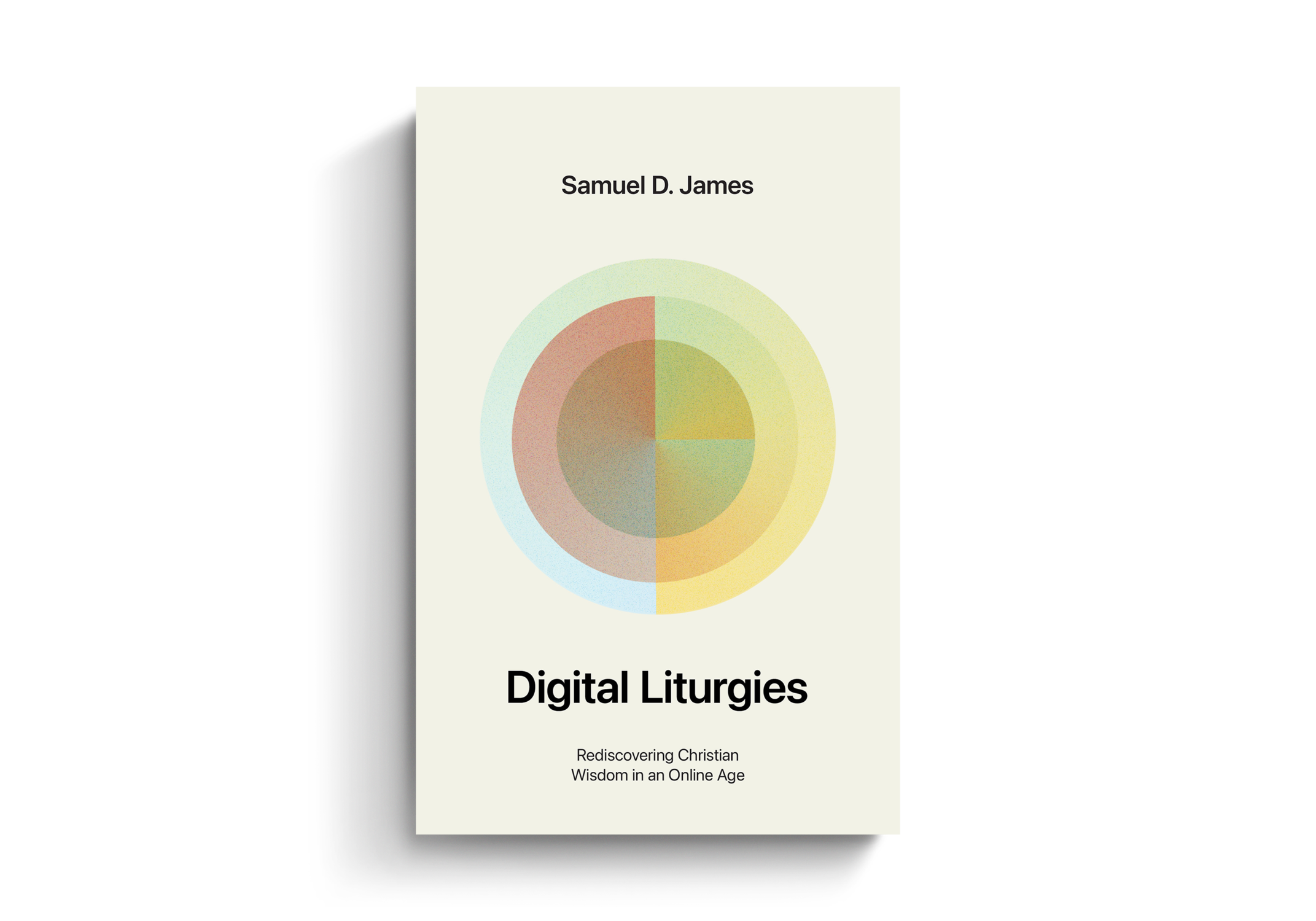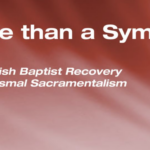About a year ago I realized that much of my thinking about technology would not be categorized as wisdom. Many people in my church work in technology and I didn’t have much to offer them by way of pastoral wisdom. I started looking for good writers and thinkers to help me, and someone recommended Samuel James. I subscribed to his newsletter and he quickly became one of my favourite writers on technology and the Christian faith. When his new book Digital Liturgies: Rediscovering Christian Wisdom in an Online Age came out, I jumped at the chance to read it.
Spoiler Alert: This book is great and you should buy it.
In this review, I will give an overview of the book, talk about why I believe it is important, and close with a personal application.

Digital Liturgies: Rediscovering Christian Wisdom in an Online Age
Samuel James
Digital Liturgies: Rediscovering Christian Wisdom in an Online Age
Samuel James
Digital Liturgies is so full of Biblically rooted, theologically rich, and immensely practical wisdom that it would be worthwhile to write an article on each chapter.
Overview
The book is organized in two parts. Part 1, “Truth and Technology,” surveys the habitat of the internet. Different habitats require and encourage different habits and values. “New technologies do more than give us new ideas or methods; they can create new neural pathways in our brains that transform how we conceive and respond to reality” (53). The habitat of the internet pushes us to become certain kinds of people because ‘“the kind of digital technologies that we carry around in our pocket and look at aimlessly throughout the day are shaping all of us into particular kinds of thinkers, whose thoughts are formed in the pattern of those technologies. In other words, we are learning to look at reality and see something different from what is actually there” (26).
Our digital technologies created the kind of world where transgender ideology and transhumanism seem logical and sound. In this first part of the book, Samuel does a masterful job showing us how that happened. He also applies key theological truths, grounding us in God’s truth about our world and ourselves.
Part 2, “Digital Liturgies,” examines the formative habits of the internet. Liturgies are habits that form us, leading us to value and desire certain things above others. “If it’s true that the web is an epistemological habitat that shapes us, then it is imperative that we are awake to this fact because we will be within that habitat almost constantly. The question is not, Is this technology shaping me right now? The question is, How is this technology shaping me right now?” (67). Using wisdom on the web isn’t just about content, it’s also about context. Having the best porn blockers is not a magic pill for keeping our hearts pure on the internet.
Being wise about the liturgies of the digital world requires attentiveness to the formative habitat of the internet. In this section, Samuel helps us pay attention to the content we engage with and the environment in which engagement takes place. Both are crucial.
Why This Book Is Important
Our environment is not determinative, but it is powerful. My wife and I got to travel to Spain for our honeymoon and when we got back to Toronto, my body fought against going back to our “normal” routine. It became used to a different rhythm, a rhythm that craved a mid-day siesta. The habitat of the internet is not an empty canvas waiting for us to paint our masterpiece. Rather, it is an environment with values and pressures which we must be alert to if we are to inhabit it wisely. “[B]y identifying how the web shapes us, we can use these technologies more deliberately, more wisely, and more Christianly” (12).
The daily rhythm of many people orbits around the internet. Emails, Zoom calls and Google workspaces are where we get work done and where we spend our breaks scrolling through social media, messaging friends, or listening to podcasts. We may even finish the day with some quality time on streaming services or video games. We work, we rest, and we connect, via the internet. If the web is that immersive and formative, then we need to understand what the internet is and we need to learn the wisdom necessary to inhabit a digitally shaped world to the glory of God.
That’s the aim of this book. Samuel explains what the internet is and how it shapes us, and then he applies Christian wisdom to ordinary people living in a digital world.
If we are to love God and live in the digital habitat, we need wisdom. A wise person is someone who understands the world they live in, can discern right from wrong and then act in alignment with the good. “Wisdom is real; wisdom is embodied. And it is wisdom that is obscured in a digital world” (12). A wise man knows God and lives in the fear of the Lord. He sees himself, “the world around him, and God for what they truly are” (23).
How do we become wise while living in a digital habitat? Retreating from the world or simply deleting all our social media apps won’t work. The answer is not that easy or mechanical. “Instead what we must do if we want to live wisely in the world God has made is identify these ideas and worldviews for what they are, and understand how they can shape and move us even when we are not conscious of any mental battle going on” (43). The answer is to use our heads and our hearts to learn who God is, to learn who we are as his image bearers, and to understand the world we inhabit. “Christian wisdom is not a texture-less posture of pure critique. Rather, it is a gospel-shaped, Spirit-empowered intellectual habit that reflects spiritual reality” (101-102).
Digital Liturgies is so full of Biblically rooted, theologically rich, and immensely practical wisdom that it would be worthwhile to write an article on each chapter. Instead, I will simply commend you to read the book and taste it for yourself.
A Personal Application: Stay Awake
Reflecting on Digital Liturgies and reviewing my notes for this review, the theme I’ve wrestled with the most is the pornographic shape of the web.
I am sure anyone who has a social media account has fallen down the rabbit hole of endless scrolling. You see one interesting reel and the next moment you look up and realize it’s been two hours. That experience is not a bug in the system, but a baked-in feature of the internet. It keeps your attention by pinging you from one piece of content to the next.
What is the cumulative effect of such habits? We become numb to the Godwardness of things. Beautiful landscapes become Instagram stories, not wonders to behold. People made in God’s image turn into content to consume. The constant and hollow habits of the social internet numb our affections and dampen our desires for genuine beauty and glory. No wonder pornography thrives in this environment. “Porn and the web go together so efficiently precisely because they are both instruments of commodification, a way to turn the most intimate or even most elementary stuff of human life into consumable content” (137).
The habit of wisdom to combat this numbness is to stay awake. Wake up or you will miss God. The prophecy of the suffering servant in Isaiah 52:13-53:12 is one of the clearest statements in all of Scripture about the person and work of Jesus. His life, death, burial, resurrection, and ascension are all featured in Isaiah’s words, but people don’t see it. “He was like someone people turned away from; he was despised, and we didn’t value him” (Isa 53:3). Three times leading up to this prophecy God says “Wake Up” (Isa 51:9, 17; 52:11).
The reality of a sleepy numbness to God and the Godwardness of everything will cause us to miss Christ. Therefore, stay awake. Create habits that guard against the numbness of the internet. Read a physical Bible. Do activities that require physical, embodied effort, and do stuff with other people. “God knows we are like grass. Precisely because of that, Scripture directs Christians to the heart-shaping habitat of the local church, where, through the power of the liturgy and the presence of Christ’s Spirit in his people, we are formed more closely in the image of Jesus” (108-109). Be intentional and habitual to wake up to the wonder of God.
Pornography is a prominent and dangerous threat to the Christian life. It turns people into content and shrinks the world into a dark, small box. Pornography thrives on the internet, because “the web, by virtue of what it is, is intrinsically pornographically shaped” (130). The novelty, ease of consumption, apparent god-like power to create a world for our pleasure and the insolation of a digital environment is tailored for porn. The answer to porn, however, is not as simple as putting the best guardrails on your web browser. The death blow to pornography is the beauty and the glory of God. Something we need to step outside of the small and boxed-in web for our eyes to see and our hearts to savour. “Blessed are the pure in heart, for they will see God” (Matt 5:8).
Gospel Habits
The habits we devote ourselves to will shape the habitat of our hearts. James says, “Habits create habitats for our hearts; they shape our identity and train our desires so that our feelings, which can change quickly, are not solely bearing up the weight of our character” (170). By devoting ourselves to the habits of the gospel like prayer, Bible reading, embodied fellowship in the church, and doing good to the poor and needy, the Holy Spirit conforms us to the image of Christ.
The gospel is the answer to the world’s digital liturgies. “In a world of unceasing noise, his voice will break through and lead us. In a world of rootless identity crisis, he reminds us that we belong to him, that we are created by and for him, and that he will wipe every tear from our eyes as we finally see the one face we have longed to see (Rev. 21). In a world of shame, he tells us that our record of debt is cancelled and that nothing can separate us from his love. In a world of lust, he offers his own broken body in the place of our defiled body (Luke 22:19). The digital liturgies that captivate so easily wither in light of who our wisdom really is and how much he has done, is doing, and will do for us” (179-180).
























